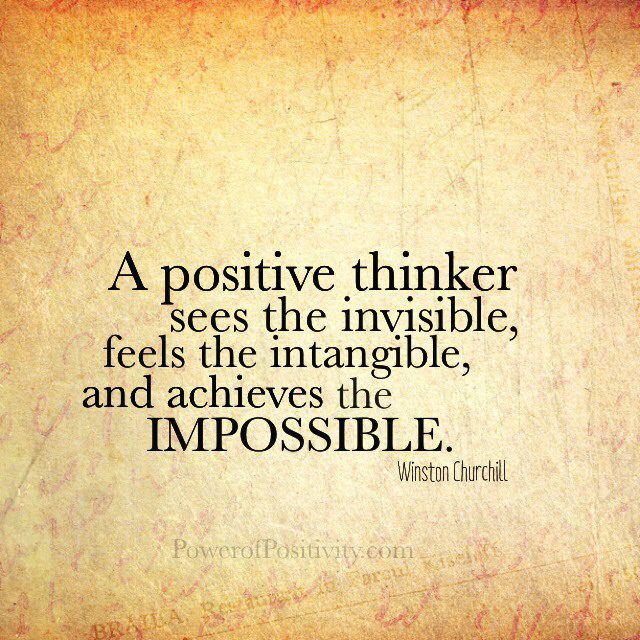People with a positive attitude stand out, don’t they? A positive thinker always attracts attention–without ever meaning to!
These individuals always have a “pep in their step” and a smile on their face. They make the most of their life and always seem to lift up everyone around them.
Not only do these folks possess a great attitude, radiate confidence, and achieve great success, they also enjoy other amazing benefits such as the reduced risk of cardiovascular disease and a longer life expectancy.
These physical benefits are not the only thing positive people have in their favor either. Positive people have certain inner characteristics that are something to behold.
We’ve made a list of five of the most important inner characteristics a positive thinker.
5 Inner Characteristics of a Positive Thinker
Positive Thinker Characteristic #1: Resilience
One by-product of a positive disposition is a resilient nature. Simply put, by being a positive thinker, even during adversity, you become tougher and stronger. This characteristic allows you to maintain emotional stability and brings forth opportunities and solutions that appear quickly and are more effective.
As a terrific individual once said, “I purposely, consciously redefine problems as opportunities.”
If you think about it, isn’t there something to be gained out of even the toughest situations? Maybe even perhaps a stronger nature or more discipline?
If these questions resonated with you, congratulations! You have a resilient nature and are on the right path to being a positive thinker. 😉
Positive Thinker Characteristic #2: Acceptance
Most of us try hard to create accomplishments in our lives. We hope, pray, and “keep on keeping on.”
Unfortunately, despite our best efforts, things can go the other way – resulting in disappointment and rejection. The concept of acceptance is so prevalent and esteemed that three of the major world religions: Christianity, Islam, and Buddhism, base their core dogmas off of it.
Acceptance allows you to learn from your mistakes and maintain perspective, rather than exaggerating or reacting dramatically. In other words, please do not beat yourself up. Just make the most of what happened, forgive yourself, and move on.
Positive Thinker Characteristic #3: Gratitude
Granted, we’ve heard it a million times. “Be thankful for what you have…”
We are all so busy with our work, families, and other obligations, that it’s easy to forget to contemplate the good (small) stuff in our lives. A roof over our heads, food on the table, a warm embrace, a paycheck, air in our lungs… these are all things to be thankful for.
Positive thinkers consciously take time each day and feel grateful for these things. Gratitude is a practice and something that needs to be cultivated and encouraged every single day. It’s not a once in a while type of thing or something you do when everything is going well. It’s a daily practice, no matter what is going on, that in time can flow very naturally to the point where you are living a life of pure gratitude and bliss.
This is in fact probably the cornerstone characteristic of a positive thinker. If we’re mindful (and honest) we can think of many things to be truly grateful for every day.
Positive Thinker Characteristic #4: Consciousness
Sometimes, it can feel as if our lives are on autopilot. Our brains are elaborate, magnificent, marvelous creations. The world’s greatest supercomputer cannot compete with the processing power of the human brain. That being said, the human brain is can easily become diluted.
The world’s most sought after psychologists and authors on topics of spiritual growth, mind power and self-improvement all base their teachings on the practice of conscious thought. What we put into our minds and program into our conscience has far-reaching effects on the kinds of lives that we live – from getting a job to maintaining a diet or exercise regimen, what we believe, we achieve.
Positive thinkers innately know this consciousness stuff. The exciting thing is that even if we are not pre-programmed to think this way; through mindfulness, prayer (meditation, etc.)), and reflection, we can attain a higher consciousness and experience a better life for ourselves.
Positive Thinker Characteristic #5: Integrity
Telling the truth is a very noble trait, but it’s more than that… integrity is about being honorable, moral, righteous and straightforward.
As human beings, we are not born with an inclination toward lying and deceptiveness. Rather, we are conditioned to think that it’s acceptable behavior. Usually, even if we aren’t conscious of it, we adopt that behavior as a way to achieve “love” and “acceptance”. Through the pressures and tribulations of this world, we sometimes feel that we can potentially benefit by telling a lie – from a “little white lie” to a gross exaggeration.
Either way, our acts (even the little ones) matter and they can and will affect us and others around us. Truth and righteousness always prevail – sometimes not always in the way we expect. Call it the cycle of Karma if you will, but either way, living a life of integrity will create a wonderful ripple effect in your life.
If you need proof, please study the most influential figures in our history. From divine figures such as Jesus and Buddha to everyday heroes like Martin Luther King and Mother Theresa, these individuals exemplified the power of integrity, despite the consequences – some of which were grave.
Integrity is a powerful characteristic of a positive thinker. The two go hand in hand just as are lying and negativity. You cannot have one without the other.
As with all of the other positive inner traits, integrity is something that truly positive people innately understand and live by; and something we can all adopt into our life.
Final Thoughts
All in all, never judge yourself if you fall short with this list. We are all human beings and we make mistakes. The important part is to learn from them and continually strive to improve daily.
Seek to understand your shortcomings and make a conscious decision to improve in one area at a time, and then another. Focusing on one area strongly will bring forth your desired outcome.
When we consciously strive to improve and mold ourselves with the power of positivity we can surely expect to have a better quality of life and become a true positive thinker.











